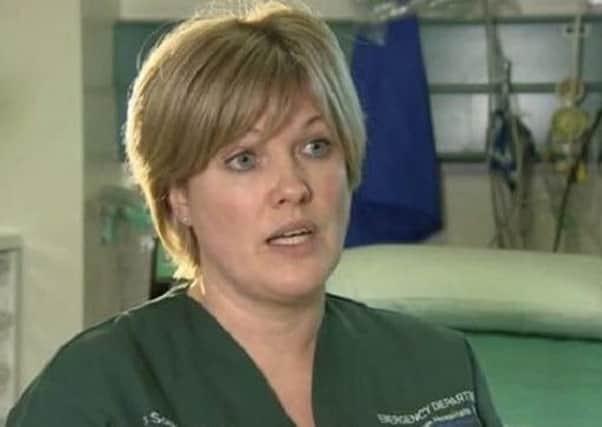A day in the life of a QA Hospital emergency doctor


Writing for The News she has given an insight into a typical shift at the busy A&E department and the difficulties medics face.
It comes as an analysis of documents drawn up to remodel the health service in England shows that 24 casualty units from Durham to Somerset have been marked for potential closure despite record demand for A&Es and serious overcrowding across the country as the NHS goes through its most severe winter crisis since records began. Last month produced the worst performance for A&E waits in 13 years.
Advertisement
Hide AdAdvertisement
Hide AdQA’s emergency department (ED) is not one of those at risk but does face substantial pressures.
‘One of our biggest challenges is flow into the hospital and patients waiting for admission,’ writes mother-of-two Dr Gough.
‘This is a national problem, with many medically fit patients waiting for packages of care.
‘This can mean there are delays in discharging patients from hospital, which leads to long waits in the emergency department.
Advertisement
Hide AdAdvertisement
Hide Ad‘We saw approximately 130,000 patients in the ED last year, over 300 per day. There are approximately 120 emergency admissions to the hospital per day.
‘We do sometimes get the occasional disruptive patient, which may because they are unwell, but also when they are under the influence of drugs or alcohol.
‘This is worse in the evenings or weekends, but doesn’t account for many patients. When demand on the service outweighs the discharges from the hospital, the pressures are felt in ED.
‘When the GP has no more appointments, you get offered an appointment for another day. ED is open all the time, we can’t close our doors.
Advertisement
Hide AdAdvertisement
Hide Ad‘When it becomes busy the ED team works hard, with all members of staff helping to see patients. Even if the department is full, it is still important to see new patients as quickly as possible.
‘There is pressure on all emergency departments in England and Portsmouth is no different. There is huge pressure on the NHS and this is felt in the Emergency Department.
‘Primary care (GP) is also under huge amounts of pressure which also affects the numbers of patients presenting to the ED.
‘Over the past eight years as a consultant and 19 years as a doctor, I have noticed a societal change. Patients are less willing to wait, and want ‘instant’ health care.
Advertisement
Hide AdAdvertisement
Hide Ad‘As a society we need to take responsibility for disease prevention – smoking cessation, reduction in alcohol consumption, weight loss and increasing our activity levels. If we don’t we are storing up healthcare problems for the future.
‘In the age of social media people (all age groups) want instant health care. Patients are not willing to wait and therefore will not infrequently present to the ED. I have no way of changing your outpatient appointment or speeding up routine investigations.
‘Emergency medicine is a fantastic speciality where I have the privilege of treating patients in an emergency.
‘I enjoy the variety, and not knowing what I will treat next. It is hugely satisfying when you treat someone and save their life. It is also satisfying treating patients with non – life threatening conditions like fractures and lacerations. These conditions are important to those patients.’
A TYPICAL SHIFT
Advertisement
Hide AdAdvertisement
Hide AdDr Sophie Gough writes: ‘A typical shift is busy and varied, treating all patients of all ages and conditions that present to the department.
‘This will be reviewing new patients presenting to the department, as well as giving on going care to patients that are in the department waiting for admission.
‘As a senior doctor I also support and help junior doctors and nurse practitioners with decision making and care for the patients they see.
‘We provide medical advice to the walk in centres at Gosport War Memorial and St Mary’s. In addition we give radio medical advice, via the Coast Guide, to any ship in UK waters or any UK registered ship anywhere in the world.
Advertisement
Hide AdAdvertisement
Hide Ad‘At the beginning of any shift there is a comprehensive handover from the out-going team to the new team. We handover any outstanding investigations or treatments, as well as identify patients who are unwell that require a consultant review.
‘We have a computerised system that patients have all their observations (pulse, blood pressure, respiratory rate, level of consciousness, oxygen levels and if they are in pain) are recorded on.
‘Based on these figures the system identifies patients that are unwell, highlighting this to the clinician and prompting a review.
‘Once this handover is complete, my priority is to review the unwell patients.
Advertisement
Hide AdAdvertisement
Hide Ad‘Next I will review patients that could be safely discharged home. This will create capacity for new patients. At the beginning of the day the department is often nearing full capacity.’
NHS bosses who have drawn up the changes as part of efforts to plug a £22bn hole in the health service budget by 2021, insist that concentration of specialist urgent services could save lives and there are no plans for a ‘significant’ reduction in the existing number of 175 emergency units. But one senior emergency doctor told the unit that the plans amount to proposal to ‘make the River Nile run backwards’ by planning for a reduction in demand for A&E services at a time when Britain has a growing and ageing population.
Research based on 44 regional blueprints by the Johnston Press Investigation Unit reveals that managers are planning to cater for up to 30 per cent fewer A&E visits and plans have already been advanced to downgrade units to urgent care centres (UCC) with fewer specialist or consultant-grade staff.